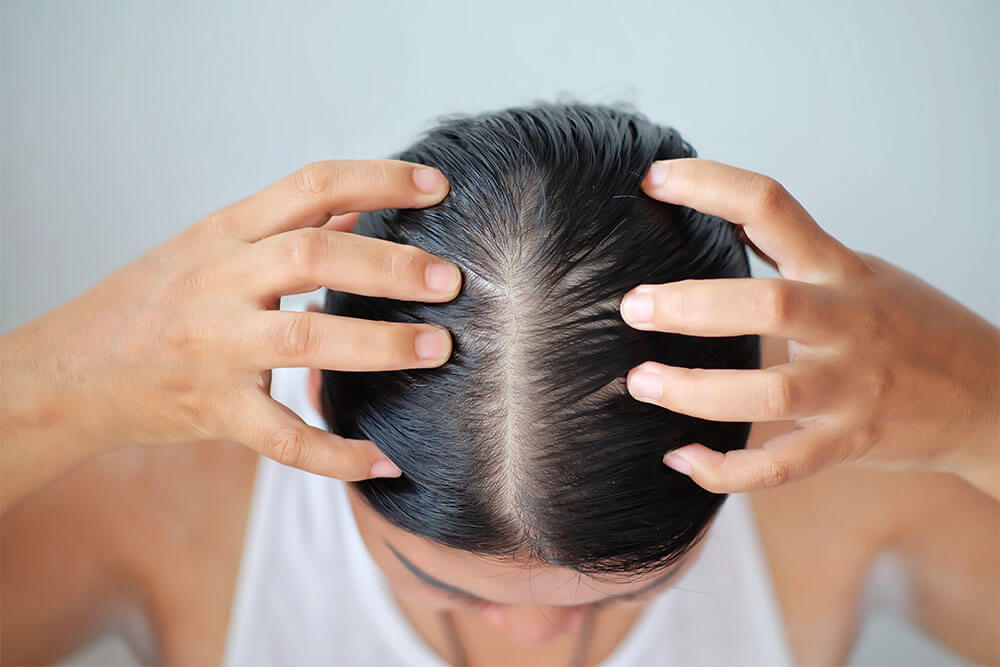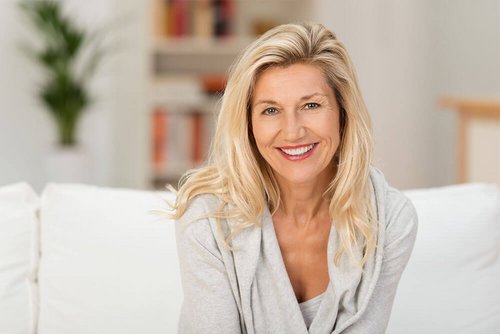Hair loss during the menopause - a very common symptom
In the menopause, many women enter a new phase of life that can bring certain physical changes. Hot flushes, mood swings and restless sleep are just some of the typical symptoms they may be experiencing. What many women don't know is that hair loss is also a common symptom!
But rest assured - you are not alone! Almost one in three menopausal women experience increased hair loss and thinning hair. But there are also good news: you can counteract hormone-induced hair loss!

Menopausal hair loss and its effects
For many women, it is not easy to see that their hair is thinning. Hair loss can also be accompanied by a change in self-confidence. For many, full hair is still considered a beauty standard. Besides, the menopause is a special phase of life, which is often perceived as stressful or straining. It is important not to let yourself be dragged down too much. Hair loss usually happens due to harmless causes and can potentially be slowed down, if not stopped. Try to give things time. Finally, mental stress is often an additional trigger for hair loss that can be avoided.
Hair loss: menopausal signs or other cause?

Hair loss can have many different causes. In order to combat the problem, it is important to find out what is causing it.
Every person loses up to 100 hairs a day, so this is quite normal. If you lose a few hairs while brushing or blow-drying, there is no reason to worry. The hair on your head is in different growth stages and since the lifespan of a hair is limited to a few years, it will eventually fall out. On average, up to 100 hairs per day reach this stage.
You should take a closer look if you lose significantly more than this amount of hair every day. Perhaps you have noticed when looking in the mirror that your hair has become thinner and flatter. Or you find more hair in your hairbrush or in the shower drain than before. Then you should get to the bottom of it. If you are already in the menopause, this could be the cause. But there are also many other triggers for hair loss.
Other factors that can lead to hair loss:
- An underestimated factor for hair loss is stress. Many people only associate it with negative pressure, but stress can also be positive. If you are chasing from one appointment to the next, various bodily functions may suffer, even though you are doing well. Allow yourself regular breaks and rest periods!
- A diet that is too one-sided can be the reason for hair loss. Micronutrients and vitamins are important for healthy and full hair. Therefore, make sure you eat a balanced diet.
- Iron deficiency or vitamin D deficiency are frequent causes of hair loss. Feel free to discuss the issue with your doctor. They can check these values and tell you what you can do. The lack of vitamins or other important nutrients can often be remedied by a change in diet or by taking food supplements.
How do I recognise menopausal hair loss?
If you are in the menopause and did not have hair loss before, it is very likely that your changed hormone balance is responsible. If you are not sure whether you have reached the menopause yet, look out for potential symptoms such as sleep disturbances, sudden hot flushes, a lack of motivation and mood swings. These are all common complaints during the menopause. In addition, the female cycle becomes more irregular. For some women, this is compounded by hair loss. You are most likely to notice this when you look in the mirror, because the density of your hair decreases, so the scalp may shine through more clearly. This is most noticeable around the crown of the head. To avoid bald patches, you can take matters into your own hands.
What caffeine can do for menopausal hair loss

If you still have the menopause ahead of you, you can take action now to help to / potentially prevent hormone-induced hair loss. There are several ways to do this: Hair care products that contain caffeine are particularly effective. Caffeine can not only wake you up in the morning, but also get the hair roots moving.
Caffeine activates the hair and penetrates into the hair follicle. To see best results, you should use Plantur 39 Caffeine Shampoo for at least two minutes every day.
The daily caffeine supply is also important if you do not wash your hair every day. The Plantur 39 Leave-In Tonic is ideal for this purpose. You simply apply it to the roots of dry hair and massage it in gently. Rinsing is not necessary! Caffeine may support your hair growth even if you have already noticed the first signs of menopausal hair loss.
Tips for hair loss during the menopause:
- For healthy and strong hair growth, the hair root needs vitamins and micronutrients such as iron and zinc. A healthy and balanced diet is therefore important for strong hair.
- There are hair care products that contain important vital substances and micronutrients such as biotin, selenium and zinc in addition to caffeine as an energy provider. Daily use is important.
- Avoid stress! A packed schedule can affect your body. Therefore, take enough time to relax in between so that your body and mind can rest.
- Blood circulation to the scalp is also important for healthy hair growth. To stimulate this, pamper yourself with a scalp massage every now and then. This works particularly well in the shower, where you can massage in your shampoo. Additionally, a scalp massage has a relaxing and stress-reducing effect!
- Sport can also help: Regular exercise not only boosts the metabolism and the immune system, it also helps us to reduce stress.
